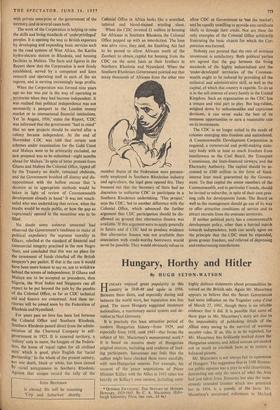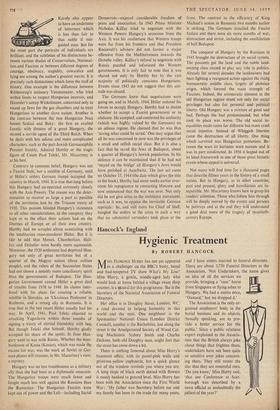Hungary, Horthy and Hitler
By HUGH SETON-WATSON
HuNGARy enjoyed great popularity in this country in 1848-49 and again in 1956. Between these dates, and especially during and between the world wars, her reputation was less good. The name Hungary suggested intolerant nationalism, a reactionary social system and de- votion to Nazi Germany.
It is precisely this least attractive period of modern Hungarian history—from 1929, and especially from 1938, until 1945—that forms the subject of Mr. Macartney's monumental work.* It is based on massive study of Hungarian original sources, including oral evidence of lead- ing participants. Sometimes one feels that the author might have checked these more carefully with non-Hungarian sources. For example, his account of the peace negotiations of Prime Minister Kallay with the Allies in 1943 relies too heavily on Kallay's own version, including some * OCTOBER FIFTEENTH THE HISTORY OF MODERN HUNGARY, 1929-1945. By C. A, Macartney. (Edin- burgh University Press, two vols., £4 4s.) highly dubious statements about personalities in- volved on the British side. Again. Mr. Macartney appears to believe that the Soviet Government had some influence on the Yugoslav coup d'etat of March 27, 1941, though there is no reliable evidence that' it did. It is possible that some of these gaps in Mr. Macartney's story are due to the impossibility of publishing details of the Allied story owing to the survival of wartime security- rules. If so, this is to be regretted, for Mr. Macartney has brilliantly tracked down the Hungarian sources, and Allied sources are needed not so much to establish facts as to restore a balanced picture. Mr. Macartney is not always fair to opponents of Hungary. The suggestion that in 1940 Ruman- ian public opinion was a prey to wild chauvinism, demanding not only the return of what the Axis had just taken from Rumania but also the mon- strously extended frontier which was promised her in 1916, is a parody of the facts. Mr. Macartney's occasional references to Michael Kdroly also .appear to have an undertone of bitterness which is less than fair to that noble if Mis- guided man. But for the most part the portraits of individuals are brilliant, and the subtleties of his distinctions be- tween various shades of Conservatism, National- ism-and Fascism or between different degrees of courage, obstinacy, stupidity, cowardice and lying are among the author's greatest merits. It is precisely such distinctions which form the stuff of history. One example is the difference between Ribbentrop's emissary Veesenmayer, who tried within limits to respect Hungarian interests, and Himmler's satrap Winkelmann, concerned only to round up Jews for the gas chambers and to treat Hungarians as another slave nation. Another is the Contrast between the two Hungarian Nazi bosses Saasi and Baky : the first an exalted fanatic with dreams of a great 'Hungary, the second a servile agent of the Third Reich. When he dFals with less odious and more complicated characters, such as the part-Jewish Germanophile Premier Imrddy, Admiral Horthy or the tragic figure of Count Paul Teleki, Mr. Macartney is at his best.
Contrary to common belief, Hungary was not a Fascist State, nor a satellite of Germany, until at Hitler's orders German troops occupied the country in March, 1944. It is true that long before this Hungary had co-operated extremely closely with the Axis Powers. The reason was the deter- mination to recover as large a part as possible of the territories lost by the Trianon treaty of 1920. This passion blinded Hungary's statesmen to all other considerations, to the company they kept or to the effect their actions had on the liberties of Europe or of their own country. Horthy had no • scruples about associating with the totalitarian mass-murderer Hitler. But it is fair to add that Messrs. Chamberlain, Hali- fax and Daladier were hardly more squeamish. Moreover, the 1920 settlement had deprived Hun- gary not only of great territories but of a quarter of the Magyar nation (three million people), and the rulers of the Succession States had not shown a notably more conciliatory spirit than the governments of Budapest. The Hun- garian Government caused Hitler a great deal of trouble from 1938 to 1940. Its claims inter- fered with his plans for creating a reliable satellite in Slovakia, an 'Ukrainian Piedmont' in Ruthenia, and a strong ally in Rumania. It is true that in the last resort Hitler usually had his way. In April, 1941, Paul Teleki objected to attacking Yugoslavia within three months of signing a treaty of eternal friendship with her.
But though Teleki shot himself, Horthy gladly accepted his share of the spoils. In June Hun- gary went to war with Russia. Whether the bom- bardment of Kassa (Kosice), which was made the excuse for war, was the work of Soviet or. Ger- man planes still remains, in Mr. Macartney's view, a mystery.
Hungary was no less troublesome as a military ally than she had been as a diplomatic associate.
The Hungarian troops were much fewer and fought much less well against the Russians than the Rumanian. The Hungarian Fascists were kept out of power and the Left—including Social Democrats—enjoyed considerable freedom of press and association. In 1943 Prime Minister Nicholas Ktillay tried to negotiate with the Western Powers Hungary's secession from the Axis. It was his misfortune that Western troops were far from his frontiers and that President Roosevelt's advisers • did not favour a major offensive from the Mediterranean towards the Danube valley. Kallay's refusal to negotiate with Russia puzzled and infuriated the Western governments. It is only fair to note that it was shared not only by Horthy but by the vast majority of politically conscious Hungarians. Events since 1943 do not suggest that this atti- tude was absurd.
The Germans knew that negotiations were going on, and in March, 1944, Hitler ordered his forces to occupy Hungary. Horthy had to decide whether to accept a Fascist government or to abdicate. He accepted, and conferred his authority (which was highly valued by the Germans) on an odious regime. He claimed that he was thus 'saving what could be saved.' One may argue that all he was concerned to save was the privileges of a small and selfish social class. But it is also a fact that he saved the Jews of Budapest, about a quarter of Hungary's Jewish population. In his defence it can be maintained that if he had not 'stayed on the bridge' all Hungary's Jews would have perished at Auschwitz. The last act came on October 15, 1944 (the date which gives the title to the book). Horthy had sonic weeks earlier over- come his repugnance to contacting Moscow and now announced that the war was over. Not only did he not give arms to the resistance movement, such as it was, to oppose the inevitable German reprisals : he, and still more his Chief of Staff, bungled the orders to the army in such a way that no substantial surrenders took place at the front. The contrast to the efficiency of King Michael's action in Rumania two months earlier is striking. The Germans installed the Fascist Szalasi and there were six more months of war, destruction and terror, including the annihilation of half Budapest.
The conquest of Hungary by the Russians in 1945 brought the destruction of its social system. The peasants got the land and the noble land- owning class ceased to play any role in politics. Already for several decades the landowners had been fighting a rearguard action against the rising bureaucratic middle class, largely of plebeian origin, which formed the main strength of Fascism? Indeed, the aristocratic element in the old Hungarian regime stood not only for social privileges but also for personal and political liberty. Old Hungary was a mixture of good and bad. Perhaps the bad predominated, but what took its place was worse. The old social in- equalities made room for different but more cruel social injustice. Instead of Whiggish liberties came the destruction of all liberty. One thing which survived was Hungarian patriotism. Be- tween the wars its horizons were narrow and it was in part misdirected. In 1956 it leaped out of its local framework in one of those great historic events whose appeal is universal.
Not many will find time for a thousand pages that describe fifteen years in the history of a small nation. But in Hungary, as in other countries, past and present, glory and humiliation are in- separable. Mr. Macartney knows how to grasp his readers' attention. Those who follow him through will be deeply moved by the events and persons he portrays and at the end they will understand a good deal more of the tragedy of twentieth- century Europe.



































 Previous page
Previous page